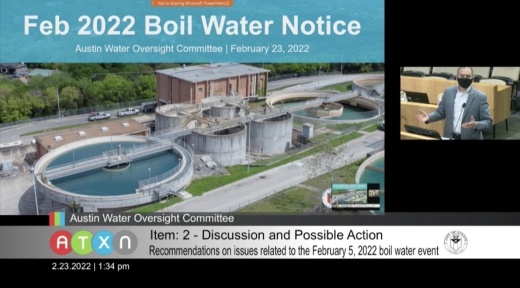Under the draft resolution, Cronk would be directed to provide City Council options relating to rectifying any adverse water bill costs experienced by Austin Water customers during the event. Alternatively, he would look into a second option to forego bill credits, instead investing the funds into infrastructure or operational improvements at the utility, according to Council Member and AWOC Chair Vanessa Fuentes.
“What we know is that Winter Storm Uri exposed how vulnerable our community is when it comes to extreme weather events ... but this most recent boil water event exposed the existing vulnerabilities within our wastewater treatment plants,” Fuentes said. “Ultimately, we need all the information laid out before us before we can make a determination on the best use of city dollars at this point in time.”
According to previous statements by outgoing Austin Water Director Greg Meszaros, the event was caused by operational errors that led to a spike in turbidity—a measure of water clarity—and triggered the need for a boil-water notice.
Randi Jenkins, assistant director of customer experience at Austin Water, said the utility has calculated proposed account bill credits for residential, multifamily and commercial customers based on discounting 40%-50% of historical average consumption in February.
These bill credits would amount to $10 for residential and multifamily Customer Assistant Program properties, $75 for multifamily customers and $50 for commercial customers, Jenkins said.
Additionally, Jenkins said the agency is handling leak adjustment requests on a per customer basis. Austin Water has received about 100 of these requests, a much smaller number than what was observed during Winter Storm Uri, Jenkins said.
A copy of the draft resolution was not available as of press time. The resolution forwarded by the AWOC will be considered by the full City Council on March 3, and Cronk will be asked to bring recommendations before City Council on March 24, Fuentes said.
“I really like this recommendation of the investment into the infrastructure because the reality is any kind of credit would be a fairly minimal amount,” Council Member Leslie Pool said. “On the other hand, it would cost the city upwards of $2 million to make those allocations, and we could instead put that money toward the very necessary infrastructure improvements that clearly are necessary and we all support and we’d like to see accomplished.”
Meszaros asked for the language in the resolution to be broad enough to not only include investments in physical infrastructure, but also operational expenses, including enhanced training and staffing needs.
The utility has previously confirmed approximately 11% of its budgeted positions are unfilled, adding that 20 employees left Austin Water in January.
Meszaros said Austin Water’s investigation into the actions staff at the Ullrich Treatment Plant took leading up to the boil-water notice will be complete in early to mid-March. Additionally, the utility will meet with City Council in closed executive session on March 1 to discuss specific system questions that relate to critical infrastructure or pose potential cybersecurity risks.
City Council also passed a resolution Feb. 17 calling for an independent investigation of Austin Water that will look into the five most-recent water quality events in the city and provide an action plan with recommended improvements.
“I think there will be more opportunities to go into more detail holistically of what transpired operationally during that time and how we can tie together alarms and actions and data logs and employee interviews into a more complete picture,” Meszaros said.





